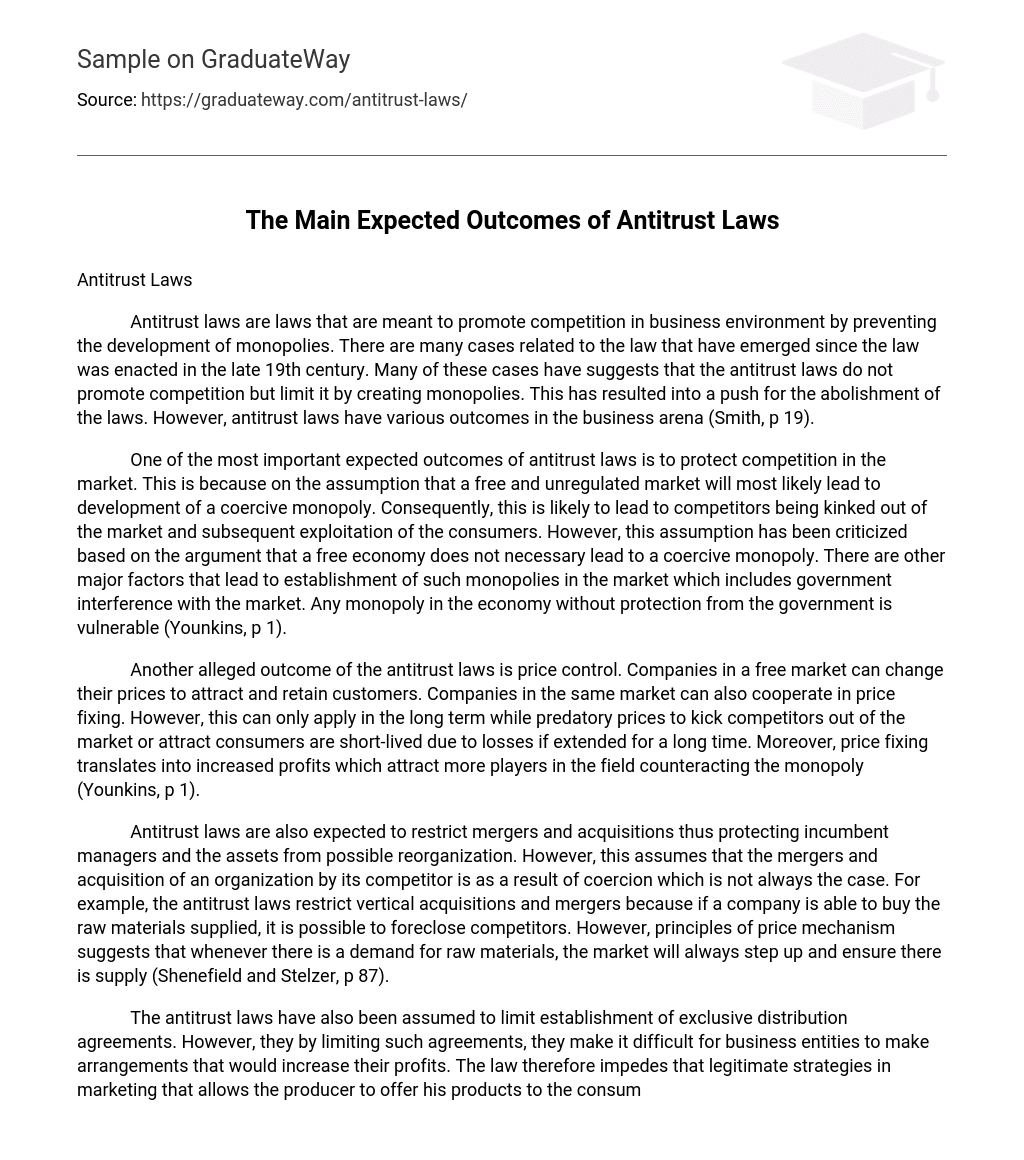Antitrust Laws
Antitrust laws are laws that are meant to promote competition in business environment by preventing the development of monopolies. There are many cases related to the law that have emerged since the law was enacted in the late 19th century. Many of these cases have suggests that the antitrust laws do not promote competition but limit it by creating monopolies. This has resulted into a push for the abolishment of the laws. However, antitrust laws have various outcomes in the business arena (Smith, p 19).
One of the most important expected outcomes of antitrust laws is to protect competition in the market. This is because on the assumption that a free and unregulated market will most likely lead to development of a coercive monopoly. Consequently, this is likely to lead to competitors being kinked out of the market and subsequent exploitation of the consumers. However, this assumption has been criticized based on the argument that a free economy does not necessary lead to a coercive monopoly. There are other major factors that lead to establishment of such monopolies in the market which includes government interference with the market. Any monopoly in the economy without protection from the government is vulnerable (Younkins, p 1).
Another alleged outcome of the antitrust laws is price control. Companies in a free market can change their prices to attract and retain customers. Companies in the same market can also cooperate in price fixing. However, this can only apply in the long term while predatory prices to kick competitors out of the market or attract consumers are short-lived due to losses if extended for a long time. Moreover, price fixing translates into increased profits which attract more players in the field counteracting the monopoly (Younkins, p 1).
Antitrust laws are also expected to restrict mergers and acquisitions thus protecting incumbent managers and the assets from possible reorganization. However, this assumes that the mergers and acquisition of an organization by its competitor is as a result of coercion which is not always the case. For example, the antitrust laws restrict vertical acquisitions and mergers because if a company is able to buy the raw materials supplied, it is possible to foreclose competitors. However, principles of price mechanism suggests that whenever there is a demand for raw materials, the market will always step up and ensure there is supply (Shenefield and Stelzer, p 87).
The antitrust laws have also been assumed to limit establishment of exclusive distribution agreements. However, they by limiting such agreements, they make it difficult for business entities to make arrangements that would increase their profits. The law therefore impedes that legitimate strategies in marketing that allows the producer to offer his products to the consumer in the most appropriate and desirable deal. However, there are some exclusive deals in any free or regulated market that are logically unacceptable (Hylton, p 72).
In conclusion, the main expected outcomes of antitrust laws are to create competition and prevent development of monopolies in the market. However, the assumptions under which these expected outcomes are based on are unrealistic. This is because in principle, antitrust laws limit the practices that are core in any competitive market. Other than promoting competition, the laws limit competition. Moreover, while protecting the inefficient businesses to remain active in the market, the laws are harmful to the consumers. Due to these assumptions, antitrust laws have been challenged in court while the push for their abolishment has gained momentum.
Work Cited
Hylton, Keith N. Antitrust law: economic theory and common law evolution, New York, Cambridge University Press, 2003.
Shenefield, John H. and Stelzer, Irwin M. The antitrust laws: a primer, Washington D. C., American Enterprise Institute, 2001.
Smith, Samuel A., “Antitrust and the Monopoly Problem: Towards a more Relevant Legal Analysis,” Antitrust Law & Economics Review, Volume 2, No. 4 (1969), pp. 19-58.
Younkins, Edward W. Antitrust Laws Should Be Abolished, 2000. Retrieved on July 30, 2010 from: http://www.quebecoislibre.org/000219-13.htm.





